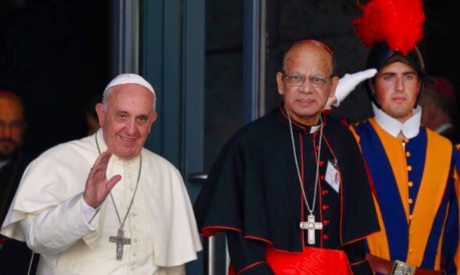Cardinal Oswald Gracias of Bombay, India, is one of Pope Francis’s closest advisers.
He’s a member of the council of cardinals re-writing the Vatican’s constitution, and he was also tapped to be one of the four coordinators of a recent Church summit on the protection of minors.
Gracias told Crux said that the reorganization of the Roman Curia – the central government of the Catholic Church – will have a “Francis effect,” and have evangelization, service and charity as its three key pillars.
Crux spoke with Gracias on July 3 about the Vatican’s new constitution, a possible papal visit to India, and other issues.
What follows are excerpts of that conversation.
You were in Rome last week for the meeting of the council of cardinals that advises the pope, and now you’re back. What brought you to the Eternal City this time?
Several things, meetings … I’m participating in the anglophone meeting for the protection of minors that brings together English-speaking bishops from around the world. I also had a meeting at the Secretariat of State to follow up on the February meeting [the summit on sexual abuse.]
The pope recently issued two motu proprios that are connected to that meeting, which focused on the protection of minors. When will we see the next follow-up to that meeting?
We’ve had a few meetings already, and I hope that by the end of the year we’re going to have formalized our contributions.
Some changes in canon law might still follow, and we also want to put more flesh on the pope’s motu proprio.
There’s one area in the protection of minors that is to make sure that the perpetrators don’t do it again.
But there’s also the promotion of good practices to create safe environments, through the training of priests, laity, family – prevention. And that is something that we need to take care of.
There are a lot of challenges still, but a lot is being done.
The new constitution is clearly no longer coming out “before the summer.” What is its new due date?
It was wishful thinking to think that it would come out in June.
The draft is ready, but we asked for feedback from all over the world and the Curia. And there have been a lot of comments that we haven’t been able to see yet.
There’s a group working on it, and tomorrow I will have a Skype conference to follow up.
But my hope is that either by September – or December at the latest – the constitution will be public.
Is it true that there are some sections that are still being written, like the role of the spokesperson or that of the Pontifical Commission for the Protection of Minors?
The draft is ready; but some issues have come up, and we’re reviewing them.
Like the whole question of how much should these be linked to the Curia or be more independent. For instance, the spokesperson.
Is it that they are the spokesman for the pope, or the Curia?
Because one is more concrete, the other gives them more access.
What will be some of the new elements of the constitution, Praedicate Evangelium?
One key element is that the Curia has to be at the service of the pope but also the bishops’ conferences.
The Curia is appointed by the pope, but it has to help everyone.
It will eventually require changes in canon law, because the Curia has always been at the service of the pope, but now it will be at the service of the pope and other bishops, of the universal Church.
This is a major change.
Another major change is that we have given episcopal conferences a central place, even if there’s still some doubts about what their juridical validity is.
But they are effective and a present situation in the world, so there’s a section on them.
Synodality and collegiality have also come out, but the principal things are being at the service of the pope and the bishops.
What does it mean that the Curia will be at the service of the bishops’ conferences? Continue reading
- Image: Crux
News category: Analysis and Comment.




